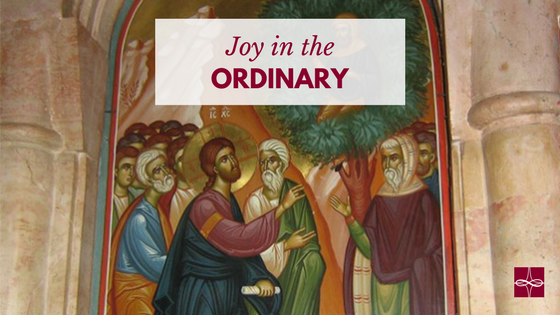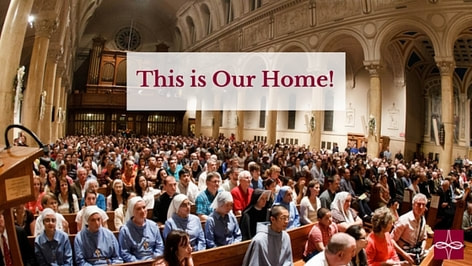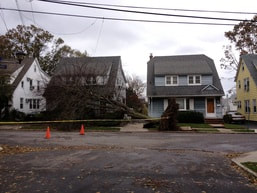|
"Good morning and welcome! Today, we celebrate the Xth Sunday in Ordinary Time. Please stand and join in singing hymn number…" Most of us will hear these words, or words very close to them, for over thirty Sundays a year. After the joyful season of Christmas, it can seem too ordinary, almost boring, to return to Ordinary Time in the Liturgical Year. Instead of the extraordinary stories of Christ's birth in the Incarnation, we've gone back to the Jesus stories many of us grew up hearing: Jesus healing lepers, chastising Pharisees, and preaching to crowds. While Jesus’ ministry is anything but ordinary, our familiarity with the stories of the Gospel often desensitizes us to their extraordinary depth and power. It’s much easier to see the seasons of Christmas and Easter, as well as Advent and Lent, as extraordinary. They're special seasons of the Liturgical Calendar, set aside to celebrate and reflect on the greatest mysteries of our faith: the Incarnation and the Passion and Resurrection of Christ. These liturgical times make us feel our faith in a more visceral way. There's nothing like the gut-wrenching Passion narrative or the beautiful story of the Nativity to set our hearts ablaze for Christ! But if our experience of the Christian faith was nothing more than an emotional high, we would never be able to see Christ in anything but the heavily emotional experiences. That's what Ordinary Time gives us: it sustains our faith between the emotional highs and lows of Christ's birth, death, and resurrection. It reminds us that God is often most present to us in our ordinary humanity. May we not forget that Christ himself lived ordinarily for thirty years as a carpenter’s son in Nazareth. It's in Christ's day-to-day ministry that He meets people where they are and experiences the human condition with them. When He forgave the woman at the well, it wasn't at a big celebration, but in the very ordinary act of gathering water. When He called Zacchaeus down from the sycamore tree, all He wanted to do was share a meal. When He flipped the moneychangers' tables at the Temple in anger, He was there for the weekly observance of the Sabbath. Ordinary Time isn't about the humdrum monotony of life. It's about the slow, incremental action of the Holy Spirit in our lives. It's about, as St. Vincent Pallotti said, seeking God in all things. Just as we get up every day and go to work, we are called to use Ordinary Time to get up every day and give our best to God. So what can we do to live Ordinary Time well? The options are endless! —Maybe you like studying Scripture, but don't know where to go deeper? Take a look at the practice of Lectio Divina. —If you feel a strong draw to the Liturgy, try attending Daily Mass once a week or following the Liturgy of the Hours. —Do you sense a call to serve more with more intentionality? Explore the needs in your community. It doesn't have to be a Church ministry to be service! After all, we're given the instruction to "Go forth!" at the end of every Mass. The beauty of our faith is that there are so many ways to experience God in our lives, to connect with Him and bring His message of love to the world. It doesn't matter which way we choose to work on our relationship with Him, so long as we do so with intention. A healthy challenge for us all might be to pick just one practice to begin making into a habit during Ordinary Time. May we invite God to shift our perspective on the “ordinary” and help us see His extraordinary presence and grace in our journey of faith!
0 Comments
This week, the Church celebrates National Vocation Awareness Week. In a particular way, we pray for an increase in awareness and openness to vocations in the priesthood and religious life. While the seminary and priesthood might have seemed like a logical next step to many of my friends and family members, it was certainly not what I had planned for myself. Very often, we get in the way of what God has planned for us because we want to be in control. We want to decide the next step. Well, as Pope Francis is fond of saying, “our God is a God of surprises.” God is certainly full of surprises: I now find myself in my third year of formation for the priesthood. I attribute this perceived vocation to the priesthood to the slow and ever-present assistance of God in my life. The Holy Spirit has been at work by placing people in my life who have assisted me in my journey of faith and discernment. These women and men have served as friends, guides, and fellow discerners of God’s call, and have assisted me in developing and sustaining healthy relationships centered on Christ and grounded in faith. While discernment is a very personal process, the vocation to the priesthood is not a “me” vocation. Priesthood is a vocation of service to the people of God. As I progressed in my discernment, I realized more and more that I am simply responding to a call that I have discerned over time, a call that I received in the sacrament of baptism. All the baptized are called to holiness, and priests are needed to preach the gospel message to them, to teach them the great truths of our faith, and to make them saints. Preaching, teaching, and sanctifying are at the very heart of a priestly vocation. Saint John Paul II said that parishes should be “genuine ‘schools’ of prayer”, and that it is the parish priest who is to be the master teacher of prayer. To be a priest is to be a servant and to stand in the person of Christ to preach, teach, and celebrate the sacraments. As a diocesan priest, I hope to do that within the context of the local parish, where I have experienced firsthand the importance of forming a community of faith. During this National Vocation Awareness Week, it is important to say thank you. Thank you for your support of vocations, seminarians, and religious in formation. Without the support of my family and friends—as well as the prayers of parishioners and total strangers—I certainly would not be in the seminary today! It is also important to ask for your prayers. The Lord certainly hears our prayers. There are many young people in our parishes and schools who are actively discerning their vocations, whether it is to priesthood, religious life, marriage, or single life. The Lord needs more laborers in the vineyard, so please pray that our communities may produce more workers to carry out his mission. Encourage young people—your children, your grandchildren, your friends, your students, your fellow parishioners—to consider what it is that the Lord may be asking of them. Sometimes simply asking the question can get the gears in motion or spur someone into speaking with a priest or religious about the possibility of a vocation. Join in asking the Lord to call more young people to discern vocations to help build up the Church. I believe that the Lord is calling many young people to serve him and the Church as priests and religious. Pray that they might have the courage to respond to that call, and to respond joyfully. To learn more about vocational discernment click here.
Growing up, I thought little of my home parish as I dutifully climbed into the family car each weekend. Upon pulling into the parking lot, I would scan the cars around me to get a sense of who would be inside and who I would attempt to chat with after Mass. It was a similar situation inside the church and it often appeared that the same people occupied the same pews week after week. While waiting for Mass to begin, I would flip through the weekly bulletin to read my pastor’s notes, read the calendar of upcoming events, and note the changes in the parish pantry and collection amount. After Mass, I’d remain to chat with the celebrant and anyone I knew for a few minutes before going off into the rest of my week. I was surely aware of the opportunities available to me at the destination of my parish, but for me it was little more than just that: a destination. Now that I’m older and have been blessed to have my faith deepened, I am more mindful of how the impact of being active in the life of my local church has supported me throughout each week. It’s like going through school: day in and day out is a routine, but after finishing, you’re able to look back and see the changes that have affected the rest of your life. At this point in my life, however, I am rarely back in my home diocese. I remain connected to life there through diocesan livestreams and social media. With the embrace of such technology, how easy and effective it has become to share news and coverage of the rich variety of events within the Church! The ability to electronically minister to and participate in the life of the local church can also be employed to the service of the diocese’s well-being. Recently, I came across the launch video for my diocese’s new “Faith to Move Mountains” endowment campaign. In it, the bishop explained the current state of the local Church and the need to jumpstart a new and rather audacious level of diocesan-wide financial support in order to continue to provide the same or better quality of services to the community: “This is our Church,” he said, looking directly through the camera at me, “This is our home. We are bracing ourselves— getting ourselves ready— for the future.” It was then that I realized how much the diocese depended on each of its parishes, which then depend on the support of their respective congregations (i.e. me) for the fulfillment of its ministries in order to continuously bring about the world’s fruitful encounter with the Risen Lord. For all the good each of our local churches do for us, how can we repay in kind? Certainly by paying attention during Mass and attending the various catechetical, service, or social events advertised in the parish, but these are not givens to be taken for granted and they often incur a cost on the parish. As my bishop observed: Catholic priests are there for the whole week. They’re there after the sermon is over after the Word is preached. Not just on Sunday mornings. They’re in our schools. They are at our hospital beds all hours of the day and night. They’re listening to our sins in the confessional. They’re counseling people… You won’t believe sometimes what people bring to the priest with the expectation that it’s going to be better when they walk out the door… Preaching the Gospel doesn’t cost a dime. Everything else, however, everything that our parishes need and try to do for you, our parishioners, carries a price.[1] The life of the Church is so very dependent on the full and active participation of its members. Not only when times are good, but especially when times are tough. Rather than running to the parking lot immediately after Mass, taking the time to personally befriend the priests and staff of the parish, continuing to participate in the charitable works of the church, supporting the businesses that sponsor ads in the weekly bulletin, and inviting others to join in doing so are some effective alternatives to simply cutting a check. Supporting each other through acts of service, stewardship and participate in parish events is at the heart of Christian goodwill. As each of us depends on the Church to guide us into Heaven, so does she look upon us to help her in her most noble evangelical enterprise of preaching the Gospel and serving the poor. I invite you to make your parish more than simply a destination. Do your part to help build a thriving parish community so that, together, you may all say, “this is our home!” It is no secret that when disaster strikes, human beings band together to take care of each other. Regardless of race, age, gender, or belief system people come together to help rebuild homes and people’s spirits. This held true in the wake of Hurricane Sandy: a hurricane that barreled up the eastern seaboard bringing destruction to parts of New Jersey and New York. Across the country, people held food and clothing drives to try and bring relief to the affected areas. In the midst of a tragedy faith, hope, and love were restored because of the actions of people across the country.
Thankfully, there was no damage done to my home when Hurricane Sandy hit, but some of my other friends were not as lucky. Their homes have been destroyed and all their memories have been washed away with the floodwaters. After talking to some of the people who did lose everything, they said their faith in humanity was restored through the charity of others. When they said it, I didn’t think much about it. But then I began to think of what the word charity and being charitable truly means. St. Francis of Assisi said, “Preach the Gospel, and if necessary, use words”. Charity is an action that embodies this idea. When sharing our faith and living out what it means to be a Catholic, we do not have to use words and preach to people. Instead, we can use actions to evangelize and show the world what it truly means to be a Catholic. Actions speak louder than words and this holds true for the New Evangelization. This has been true for years, but I have not seen it displayed as prominently as I have through the hurricane relief efforts. Regardless of age, people are pitching in and donating both time and money. Their actions are showing what it means not only to be charitable but also Christian. Young adults can use charity and Catholic Social Teaching to live out the New Evangelization not only during a time of crisis but during their everyday life. Catholic Social Teaching provides guidelines that people can use to live a just and moral life. Seven key themes of the Church’s social teaching include: life and dignity of the human person, call to family, community, and participation, rights and responsibilities, option for the poor and vulnerable, dignity of the rights of workers, solidarity and care for God’s creation. Catholic Social Teaching offers ways to live out our faith in everyday life and helps us in becoming tangible signs of Christ’s love. I tell my students everyday that what we learn in class does not stop when they walk out the door. We are all walking signs of God’s love and it is our mission to spread it to everyone. Through our actions let us work to restore faith, hope and love in our world and be part of this New Evangelization. Erin Flynn is a religion teacher at The Mary Louis Academy in New York. “The Lord be with you!”
If you’re still tempted to respond “And also with you!” you’re not alone. We’re approaching six months since the third edition of the Roman Missal was introduced in the United States, and most Mass-goers seem to be getting the hang of it. But as the responses become more of a habit, there is a danger that we begin to overlook the significance of what we are saying. I’ll proudly admit it: I love the new translation of the Mass! It is so beautiful to praise God with such eloquence and majesty. But my favorite part is the end of Mass. Not because “yay, Mass is over,” but because we are commissioned and sent forth to do God’s work in the world. In the new translation, the priest or deacon has four options for the dismissal. Note that each begins with “Go!” We are being sent out. The new ones are particularly poignant: “Go in peace, glorifying the Lord by your life” and “Go and announce the Gospel of the Lord.” Amen! I am reminded of the words often attributed to St. Francis, “Preach the Gospel at all times, when necessary use words.” The word “apostle” means “one who is sent.” Having received Christ during the Mass, we are sent forth as emissaries of the Gospel in the world. Each of us is called to be a modern day apostle, glorifying God in our everyday lives and “preaching” the good news of the Gospel through simple Christian witness. If we are to guard against the temptation to simply ‘go through the motions’ once we have committed the new mass responses to memory, we must continue to examine the import of the words that we are saying. Taking into account the words of the dismissal, how can we better glorify the Lord by our lives and announce the “good news” as Christian apostles in the world? Acting as leaven and enabled by God’s grace, we can raise up our fallen world to the glory of God. So what are you waiting for? Go! Nick Wagman is the Project Management & IT Coordinator for the Catholic Apostolate Center. |
Details
Archives
July 2024
Categories
All
|
About |
Media |
© COPYRIGHT 2024 | ALL RIGHTS RESERVED








 RSS Feed
RSS Feed